Project Management: In-depth Report on Capturing Lessons Learnt
VerifiedAdded on 2023/06/04
|8
|2168
|80
Report
AI Summary
This report delves into the critical aspect of capturing and utilizing lessons learnt in project management. It outlines a framework for gathering and documenting these lessons, emphasizing the importance of involving stakeholders and using repositories. The report includes three specific lessons learnt: evaluating repositories, defining the present state using metrics, and transitioning from Waterfall to Agile methodologies. For each lesson, an improvement strategy is proposed, detailing how to measure its success, its relevance, and when it should be implemented. The report concludes by highlighting the significance of analyzing projects to identify effective lessons, promoting continuous development, and leveraging experiences to ensure subsequent projects are completed with higher quality, less time, and fewer errors. References to academic literature are also provided to support the analysis and recommendations.

TERM 2 ASS_3
LESSONS LEARNT
Name: Insert full name
Student Number Insert student number
Campus: Insert campus or distance
Tutor: Insert tutor name
Tutorial number: Insert the tutorial number
LESSONS LEARNT
Name: Insert full name
Student Number Insert student number
Campus: Insert campus or distance
Tutor: Insert tutor name
Tutorial number: Insert the tutorial number
Paraphrase This Document
Need a fresh take? Get an instant paraphrase of this document with our AI Paraphraser
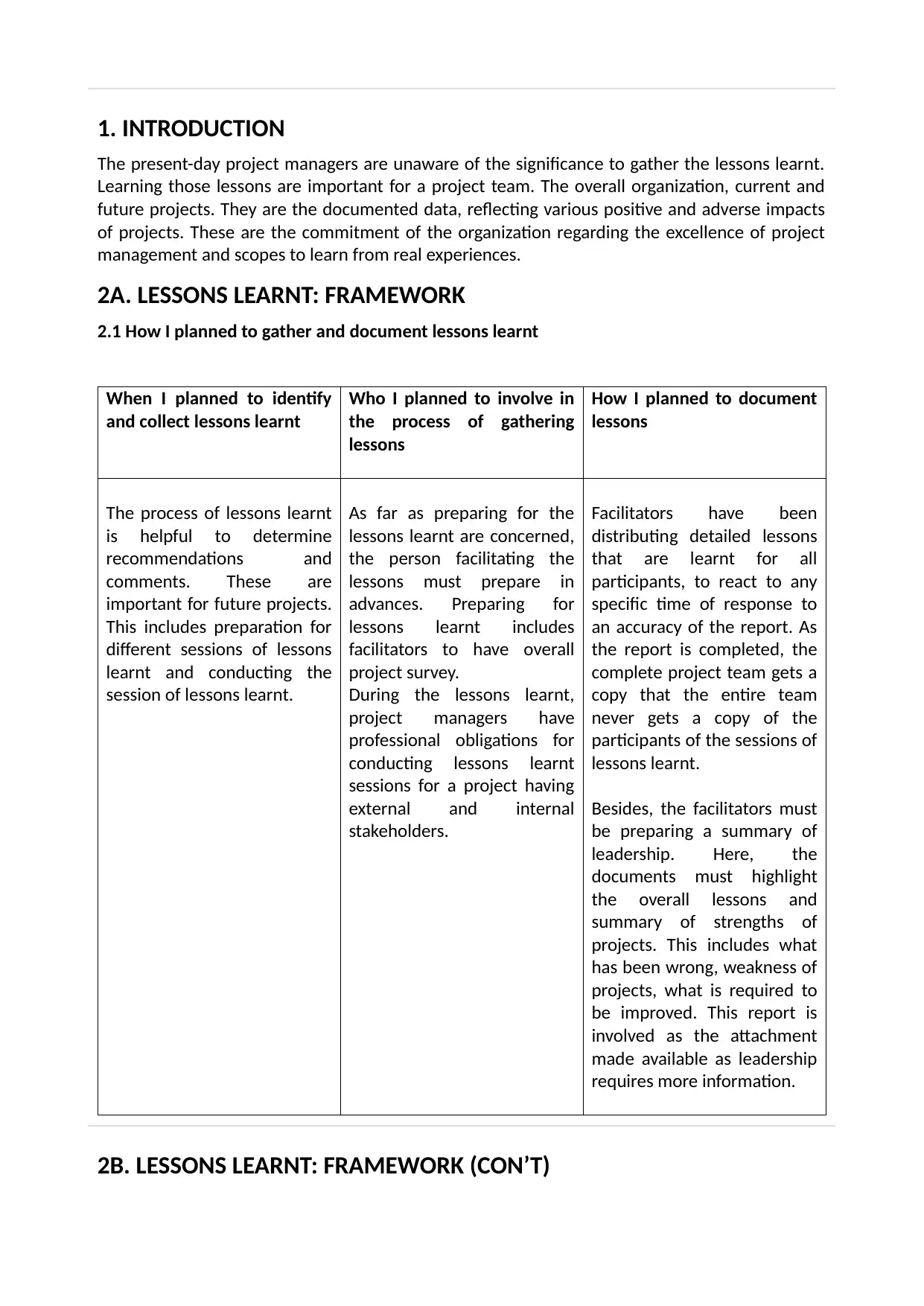
1. INTRODUCTION
The present-day project managers are unaware of the significance to gather the lessons learnt.
Learning those lessons are important for a project team. The overall organization, current and
future projects. They are the documented data, reflecting various positive and adverse impacts
of projects. These are the commitment of the organization regarding the excellence of project
management and scopes to learn from real experiences.
2A. LESSONS LEARNT: FRAMEWORK
2.1 How I planned to gather and document lessons learnt
When I planned to identify
and collect lessons learnt
Who I planned to involve in
the process of gathering
lessons
How I planned to document
lessons
The process of lessons learnt
is helpful to determine
recommendations and
comments. These are
important for future projects.
This includes preparation for
different sessions of lessons
learnt and conducting the
session of lessons learnt.
As far as preparing for the
lessons learnt are concerned,
the person facilitating the
lessons must prepare in
advances. Preparing for
lessons learnt includes
facilitators to have overall
project survey.
During the lessons learnt,
project managers have
professional obligations for
conducting lessons learnt
sessions for a project having
external and internal
stakeholders.
Facilitators have been
distributing detailed lessons
that are learnt for all
participants, to react to any
specific time of response to
an accuracy of the report. As
the report is completed, the
complete project team gets a
copy that the entire team
never gets a copy of the
participants of the sessions of
lessons learnt.
Besides, the facilitators must
be preparing a summary of
leadership. Here, the
documents must highlight
the overall lessons and
summary of strengths of
projects. This includes what
has been wrong, weakness of
projects, what is required to
be improved. This report is
involved as the attachment
made available as leadership
requires more information.
2B. LESSONS LEARNT: FRAMEWORK (CON’T)
The present-day project managers are unaware of the significance to gather the lessons learnt.
Learning those lessons are important for a project team. The overall organization, current and
future projects. They are the documented data, reflecting various positive and adverse impacts
of projects. These are the commitment of the organization regarding the excellence of project
management and scopes to learn from real experiences.
2A. LESSONS LEARNT: FRAMEWORK
2.1 How I planned to gather and document lessons learnt
When I planned to identify
and collect lessons learnt
Who I planned to involve in
the process of gathering
lessons
How I planned to document
lessons
The process of lessons learnt
is helpful to determine
recommendations and
comments. These are
important for future projects.
This includes preparation for
different sessions of lessons
learnt and conducting the
session of lessons learnt.
As far as preparing for the
lessons learnt are concerned,
the person facilitating the
lessons must prepare in
advances. Preparing for
lessons learnt includes
facilitators to have overall
project survey.
During the lessons learnt,
project managers have
professional obligations for
conducting lessons learnt
sessions for a project having
external and internal
stakeholders.
Facilitators have been
distributing detailed lessons
that are learnt for all
participants, to react to any
specific time of response to
an accuracy of the report. As
the report is completed, the
complete project team gets a
copy that the entire team
never gets a copy of the
participants of the sessions of
lessons learnt.
Besides, the facilitators must
be preparing a summary of
leadership. Here, the
documents must highlight
the overall lessons and
summary of strengths of
projects. This includes what
has been wrong, weakness of
projects, what is required to
be improved. This report is
involved as the attachment
made available as leadership
requires more information.
2B. LESSONS LEARNT: FRAMEWORK (CON’T)
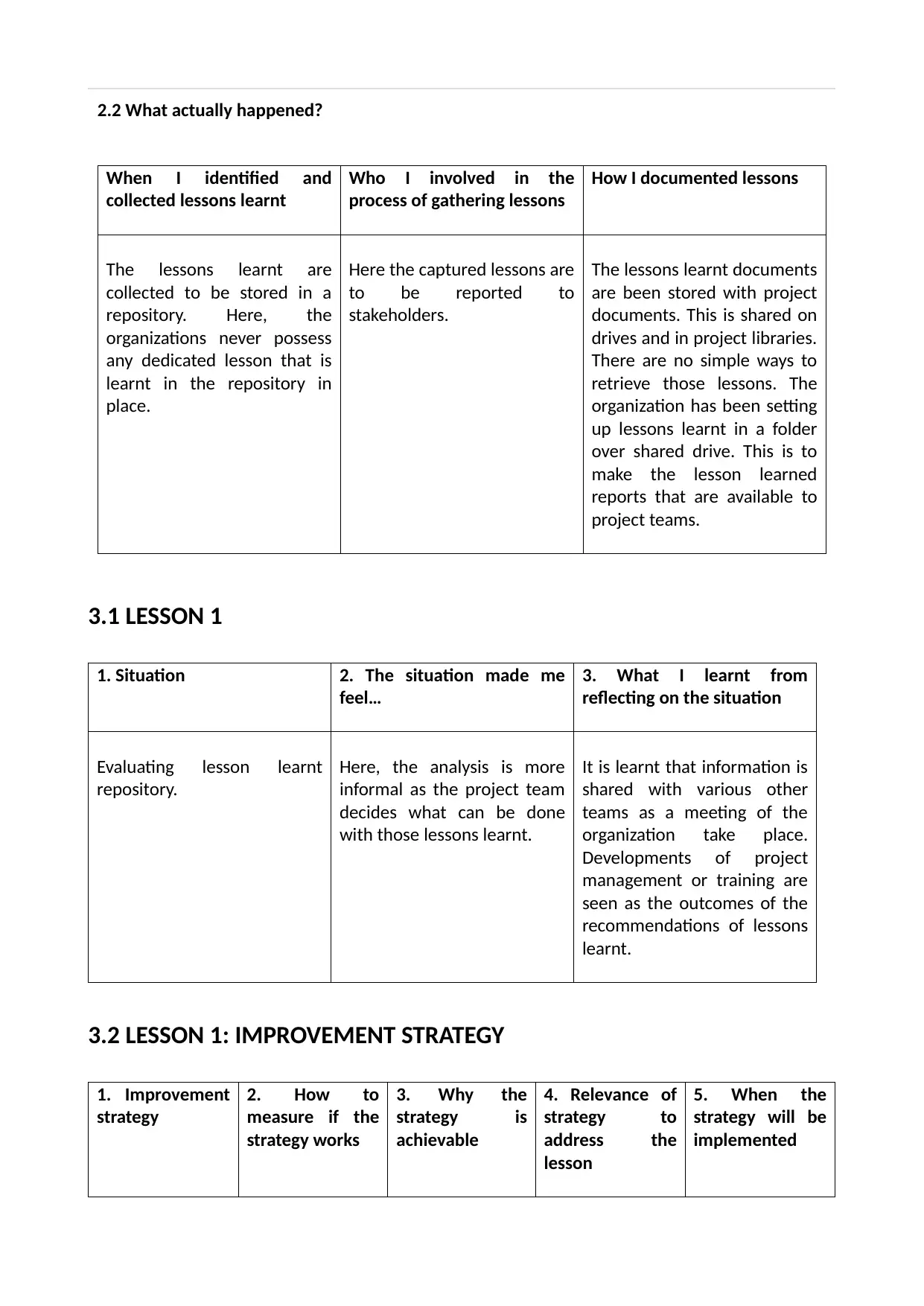
2.2 What actually happened?
When I identified and
collected lessons learnt
Who I involved in the
process of gathering lessons
How I documented lessons
The lessons learnt are
collected to be stored in a
repository. Here, the
organizations never possess
any dedicated lesson that is
learnt in the repository in
place.
Here the captured lessons are
to be reported to
stakeholders.
The lessons learnt documents
are been stored with project
documents. This is shared on
drives and in project libraries.
There are no simple ways to
retrieve those lessons. The
organization has been setting
up lessons learnt in a folder
over shared drive. This is to
make the lesson learned
reports that are available to
project teams.
3.1 LESSON 1
1. Situation 2. The situation made me
feel…
3. What I learnt from
reflecting on the situation
Evaluating lesson learnt
repository.
Here, the analysis is more
informal as the project team
decides what can be done
with those lessons learnt.
It is learnt that information is
shared with various other
teams as a meeting of the
organization take place.
Developments of project
management or training are
seen as the outcomes of the
recommendations of lessons
learnt.
3.2 LESSON 1: IMPROVEMENT STRATEGY
1. Improvement
strategy
2. How to
measure if the
strategy works
3. Why the
strategy is
achievable
4. Relevance of
strategy to
address the
lesson
5. When the
strategy will be
implemented
When I identified and
collected lessons learnt
Who I involved in the
process of gathering lessons
How I documented lessons
The lessons learnt are
collected to be stored in a
repository. Here, the
organizations never possess
any dedicated lesson that is
learnt in the repository in
place.
Here the captured lessons are
to be reported to
stakeholders.
The lessons learnt documents
are been stored with project
documents. This is shared on
drives and in project libraries.
There are no simple ways to
retrieve those lessons. The
organization has been setting
up lessons learnt in a folder
over shared drive. This is to
make the lesson learned
reports that are available to
project teams.
3.1 LESSON 1
1. Situation 2. The situation made me
feel…
3. What I learnt from
reflecting on the situation
Evaluating lesson learnt
repository.
Here, the analysis is more
informal as the project team
decides what can be done
with those lessons learnt.
It is learnt that information is
shared with various other
teams as a meeting of the
organization take place.
Developments of project
management or training are
seen as the outcomes of the
recommendations of lessons
learnt.
3.2 LESSON 1: IMPROVEMENT STRATEGY
1. Improvement
strategy
2. How to
measure if the
strategy works
3. Why the
strategy is
achievable
4. Relevance of
strategy to
address the
lesson
5. When the
strategy will be
implemented
⊘ This is a preview!⊘
Do you want full access?
Subscribe today to unlock all pages.

Trusted by 1+ million students worldwide
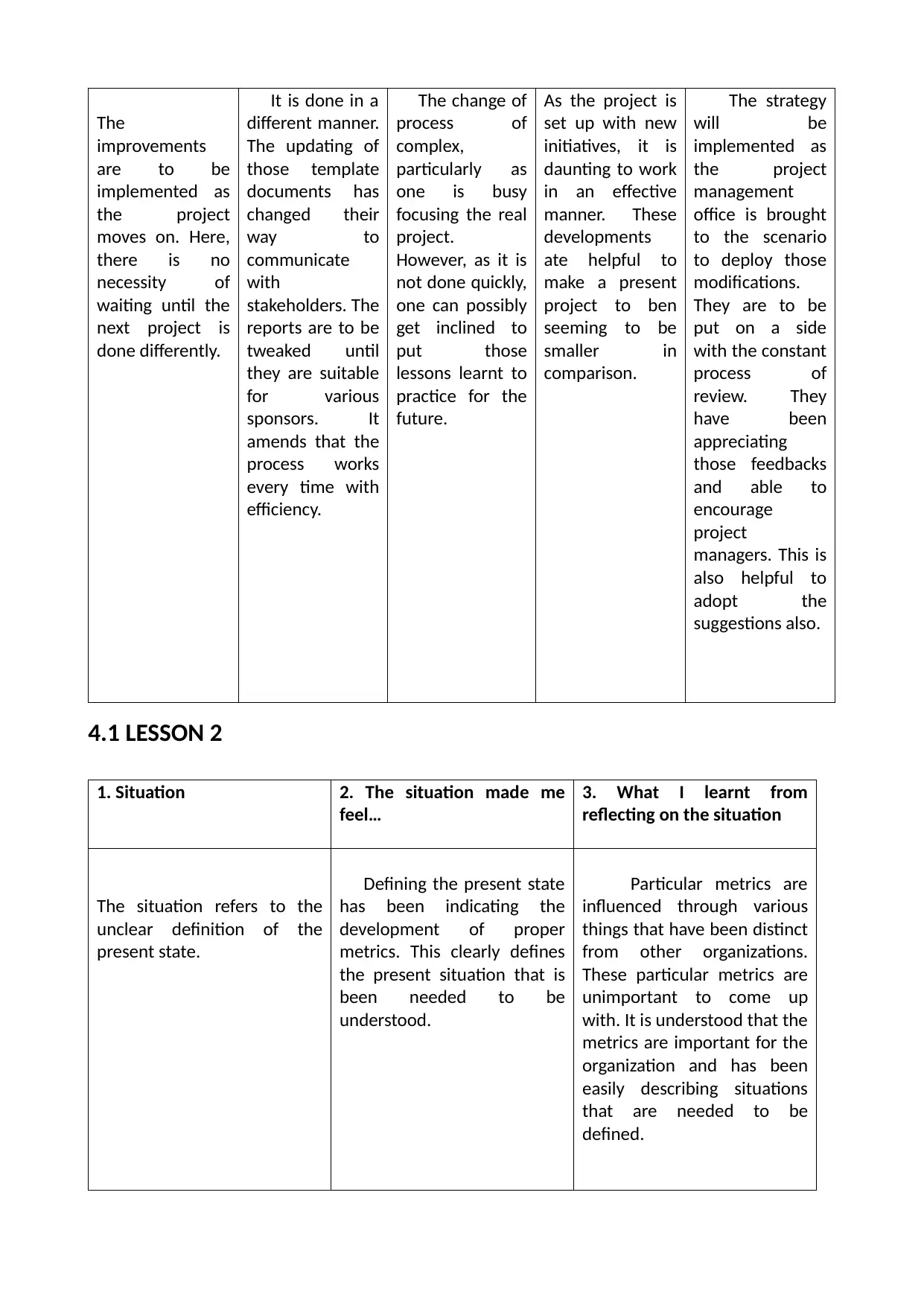
The
improvements
are to be
implemented as
the project
moves on. Here,
there is no
necessity of
waiting until the
next project is
done differently.
It is done in a
different manner.
The updating of
those template
documents has
changed their
way to
communicate
with
stakeholders. The
reports are to be
tweaked until
they are suitable
for various
sponsors. It
amends that the
process works
every time with
efficiency.
The change of
process of
complex,
particularly as
one is busy
focusing the real
project.
However, as it is
not done quickly,
one can possibly
get inclined to
put those
lessons learnt to
practice for the
future.
As the project is
set up with new
initiatives, it is
daunting to work
in an effective
manner. These
developments
ate helpful to
make a present
project to ben
seeming to be
smaller in
comparison.
The strategy
will be
implemented as
the project
management
office is brought
to the scenario
to deploy those
modifications.
They are to be
put on a side
with the constant
process of
review. They
have been
appreciating
those feedbacks
and able to
encourage
project
managers. This is
also helpful to
adopt the
suggestions also.
4.1 LESSON 2
1. Situation 2. The situation made me
feel…
3. What I learnt from
reflecting on the situation
The situation refers to the
unclear definition of the
present state.
Defining the present state
has been indicating the
development of proper
metrics. This clearly defines
the present situation that is
been needed to be
understood.
Particular metrics are
influenced through various
things that have been distinct
from other organizations.
These particular metrics are
unimportant to come up
with. It is understood that the
metrics are important for the
organization and has been
easily describing situations
that are needed to be
defined.
improvements
are to be
implemented as
the project
moves on. Here,
there is no
necessity of
waiting until the
next project is
done differently.
It is done in a
different manner.
The updating of
those template
documents has
changed their
way to
communicate
with
stakeholders. The
reports are to be
tweaked until
they are suitable
for various
sponsors. It
amends that the
process works
every time with
efficiency.
The change of
process of
complex,
particularly as
one is busy
focusing the real
project.
However, as it is
not done quickly,
one can possibly
get inclined to
put those
lessons learnt to
practice for the
future.
As the project is
set up with new
initiatives, it is
daunting to work
in an effective
manner. These
developments
ate helpful to
make a present
project to ben
seeming to be
smaller in
comparison.
The strategy
will be
implemented as
the project
management
office is brought
to the scenario
to deploy those
modifications.
They are to be
put on a side
with the constant
process of
review. They
have been
appreciating
those feedbacks
and able to
encourage
project
managers. This is
also helpful to
adopt the
suggestions also.
4.1 LESSON 2
1. Situation 2. The situation made me
feel…
3. What I learnt from
reflecting on the situation
The situation refers to the
unclear definition of the
present state.
Defining the present state
has been indicating the
development of proper
metrics. This clearly defines
the present situation that is
been needed to be
understood.
Particular metrics are
influenced through various
things that have been distinct
from other organizations.
These particular metrics are
unimportant to come up
with. It is understood that the
metrics are important for the
organization and has been
easily describing situations
that are needed to be
defined.
Paraphrase This Document
Need a fresh take? Get an instant paraphrase of this document with our AI Paraphraser
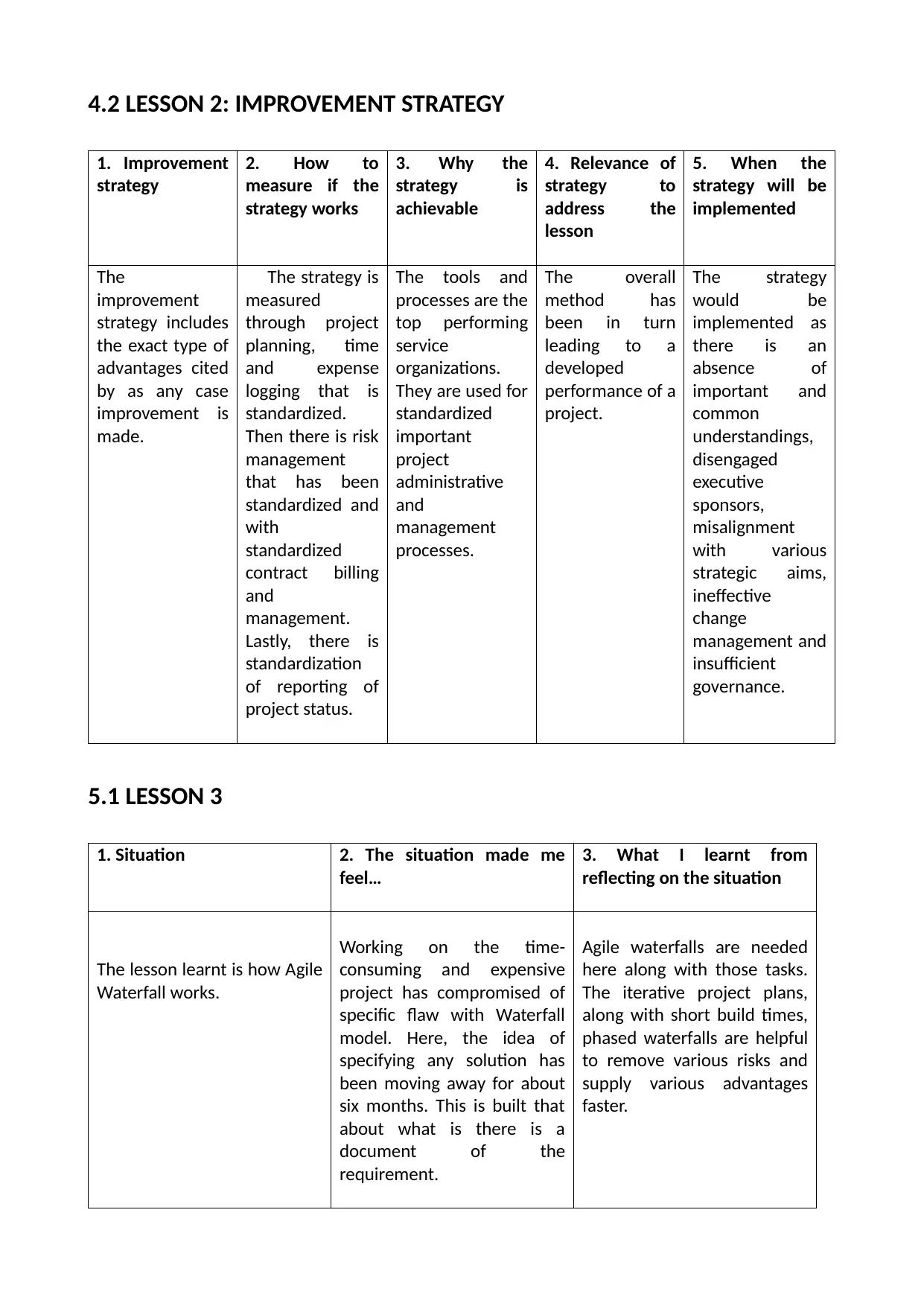
4.2 LESSON 2: IMPROVEMENT STRATEGY
1. Improvement
strategy
2. How to
measure if the
strategy works
3. Why the
strategy is
achievable
4. Relevance of
strategy to
address the
lesson
5. When the
strategy will be
implemented
The
improvement
strategy includes
the exact type of
advantages cited
by as any case
improvement is
made.
The strategy is
measured
through project
planning, time
and expense
logging that is
standardized.
Then there is risk
management
that has been
standardized and
with
standardized
contract billing
and
management.
Lastly, there is
standardization
of reporting of
project status.
The tools and
processes are the
top performing
service
organizations.
They are used for
standardized
important
project
administrative
and
management
processes.
The overall
method has
been in turn
leading to a
developed
performance of a
project.
The strategy
would be
implemented as
there is an
absence of
important and
common
understandings,
disengaged
executive
sponsors,
misalignment
with various
strategic aims,
ineffective
change
management and
insufficient
governance.
5.1 LESSON 3
1. Situation 2. The situation made me
feel…
3. What I learnt from
reflecting on the situation
The lesson learnt is how Agile
Waterfall works.
Working on the time-
consuming and expensive
project has compromised of
specific flaw with Waterfall
model. Here, the idea of
specifying any solution has
been moving away for about
six months. This is built that
about what is there is a
document of the
requirement.
Agile waterfalls are needed
here along with those tasks.
The iterative project plans,
along with short build times,
phased waterfalls are helpful
to remove various risks and
supply various advantages
faster.
1. Improvement
strategy
2. How to
measure if the
strategy works
3. Why the
strategy is
achievable
4. Relevance of
strategy to
address the
lesson
5. When the
strategy will be
implemented
The
improvement
strategy includes
the exact type of
advantages cited
by as any case
improvement is
made.
The strategy is
measured
through project
planning, time
and expense
logging that is
standardized.
Then there is risk
management
that has been
standardized and
with
standardized
contract billing
and
management.
Lastly, there is
standardization
of reporting of
project status.
The tools and
processes are the
top performing
service
organizations.
They are used for
standardized
important
project
administrative
and
management
processes.
The overall
method has
been in turn
leading to a
developed
performance of a
project.
The strategy
would be
implemented as
there is an
absence of
important and
common
understandings,
disengaged
executive
sponsors,
misalignment
with various
strategic aims,
ineffective
change
management and
insufficient
governance.
5.1 LESSON 3
1. Situation 2. The situation made me
feel…
3. What I learnt from
reflecting on the situation
The lesson learnt is how Agile
Waterfall works.
Working on the time-
consuming and expensive
project has compromised of
specific flaw with Waterfall
model. Here, the idea of
specifying any solution has
been moving away for about
six months. This is built that
about what is there is a
document of the
requirement.
Agile waterfalls are needed
here along with those tasks.
The iterative project plans,
along with short build times,
phased waterfalls are helpful
to remove various risks and
supply various advantages
faster.
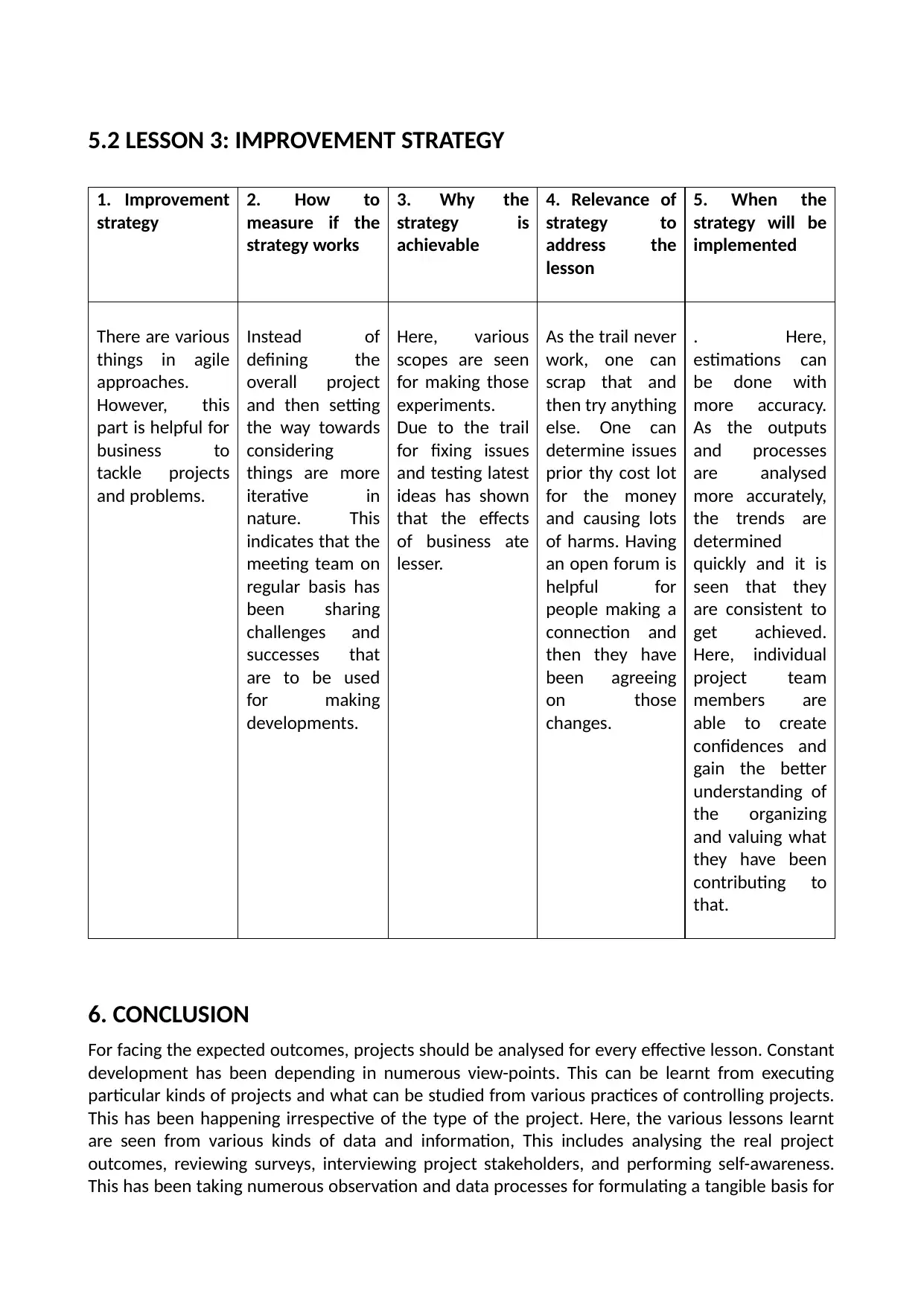
5.2 LESSON 3: IMPROVEMENT STRATEGY
1. Improvement
strategy
2. How to
measure if the
strategy works
3. Why the
strategy is
achievable
4. Relevance of
strategy to
address the
lesson
5. When the
strategy will be
implemented
There are various
things in agile
approaches.
However, this
part is helpful for
business to
tackle projects
and problems.
Instead of
defining the
overall project
and then setting
the way towards
considering
things are more
iterative in
nature. This
indicates that the
meeting team on
regular basis has
been sharing
challenges and
successes that
are to be used
for making
developments.
Here, various
scopes are seen
for making those
experiments.
Due to the trail
for fixing issues
and testing latest
ideas has shown
that the effects
of business ate
lesser.
As the trail never
work, one can
scrap that and
then try anything
else. One can
determine issues
prior thy cost lot
for the money
and causing lots
of harms. Having
an open forum is
helpful for
people making a
connection and
then they have
been agreeing
on those
changes.
. Here,
estimations can
be done with
more accuracy.
As the outputs
and processes
are analysed
more accurately,
the trends are
determined
quickly and it is
seen that they
are consistent to
get achieved.
Here, individual
project team
members are
able to create
confidences and
gain the better
understanding of
the organizing
and valuing what
they have been
contributing to
that.
6. CONCLUSION
For facing the expected outcomes, projects should be analysed for every effective lesson. Constant
development has been depending in numerous view-points. This can be learnt from executing
particular kinds of projects and what can be studied from various practices of controlling projects.
This has been happening irrespective of the type of the project. Here, the various lessons learnt
are seen from various kinds of data and information, This includes analysing the real project
outcomes, reviewing surveys, interviewing project stakeholders, and performing self-awareness.
This has been taking numerous observation and data processes for formulating a tangible basis for
1. Improvement
strategy
2. How to
measure if the
strategy works
3. Why the
strategy is
achievable
4. Relevance of
strategy to
address the
lesson
5. When the
strategy will be
implemented
There are various
things in agile
approaches.
However, this
part is helpful for
business to
tackle projects
and problems.
Instead of
defining the
overall project
and then setting
the way towards
considering
things are more
iterative in
nature. This
indicates that the
meeting team on
regular basis has
been sharing
challenges and
successes that
are to be used
for making
developments.
Here, various
scopes are seen
for making those
experiments.
Due to the trail
for fixing issues
and testing latest
ideas has shown
that the effects
of business ate
lesser.
As the trail never
work, one can
scrap that and
then try anything
else. One can
determine issues
prior thy cost lot
for the money
and causing lots
of harms. Having
an open forum is
helpful for
people making a
connection and
then they have
been agreeing
on those
changes.
. Here,
estimations can
be done with
more accuracy.
As the outputs
and processes
are analysed
more accurately,
the trends are
determined
quickly and it is
seen that they
are consistent to
get achieved.
Here, individual
project team
members are
able to create
confidences and
gain the better
understanding of
the organizing
and valuing what
they have been
contributing to
that.
6. CONCLUSION
For facing the expected outcomes, projects should be analysed for every effective lesson. Constant
development has been depending in numerous view-points. This can be learnt from executing
particular kinds of projects and what can be studied from various practices of controlling projects.
This has been happening irrespective of the type of the project. Here, the various lessons learnt
are seen from various kinds of data and information, This includes analysing the real project
outcomes, reviewing surveys, interviewing project stakeholders, and performing self-awareness.
This has been taking numerous observation and data processes for formulating a tangible basis for
⊘ This is a preview!⊘
Do you want full access?
Subscribe today to unlock all pages.

Trusted by 1+ million students worldwide
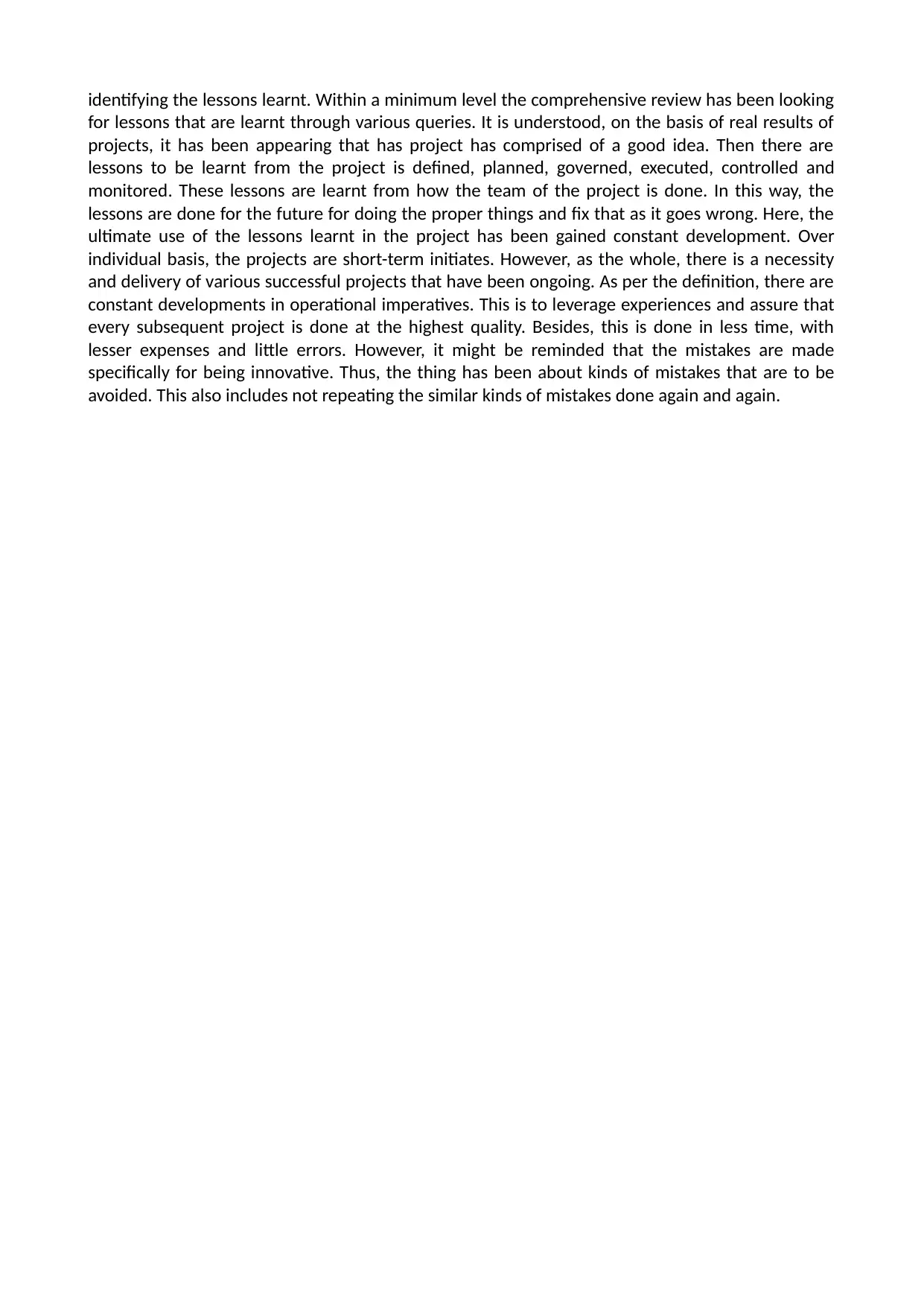
identifying the lessons learnt. Within a minimum level the comprehensive review has been looking
for lessons that are learnt through various queries. It is understood, on the basis of real results of
projects, it has been appearing that has project has comprised of a good idea. Then there are
lessons to be learnt from the project is defined, planned, governed, executed, controlled and
monitored. These lessons are learnt from how the team of the project is done. In this way, the
lessons are done for the future for doing the proper things and fix that as it goes wrong. Here, the
ultimate use of the lessons learnt in the project has been gained constant development. Over
individual basis, the projects are short-term initiates. However, as the whole, there is a necessity
and delivery of various successful projects that have been ongoing. As per the definition, there are
constant developments in operational imperatives. This is to leverage experiences and assure that
every subsequent project is done at the highest quality. Besides, this is done in less time, with
lesser expenses and little errors. However, it might be reminded that the mistakes are made
specifically for being innovative. Thus, the thing has been about kinds of mistakes that are to be
avoided. This also includes not repeating the similar kinds of mistakes done again and again.
for lessons that are learnt through various queries. It is understood, on the basis of real results of
projects, it has been appearing that has project has comprised of a good idea. Then there are
lessons to be learnt from the project is defined, planned, governed, executed, controlled and
monitored. These lessons are learnt from how the team of the project is done. In this way, the
lessons are done for the future for doing the proper things and fix that as it goes wrong. Here, the
ultimate use of the lessons learnt in the project has been gained constant development. Over
individual basis, the projects are short-term initiates. However, as the whole, there is a necessity
and delivery of various successful projects that have been ongoing. As per the definition, there are
constant developments in operational imperatives. This is to leverage experiences and assure that
every subsequent project is done at the highest quality. Besides, this is done in less time, with
lesser expenses and little errors. However, it might be reminded that the mistakes are made
specifically for being innovative. Thus, the thing has been about kinds of mistakes that are to be
avoided. This also includes not repeating the similar kinds of mistakes done again and again.
Paraphrase This Document
Need a fresh take? Get an instant paraphrase of this document with our AI Paraphraser
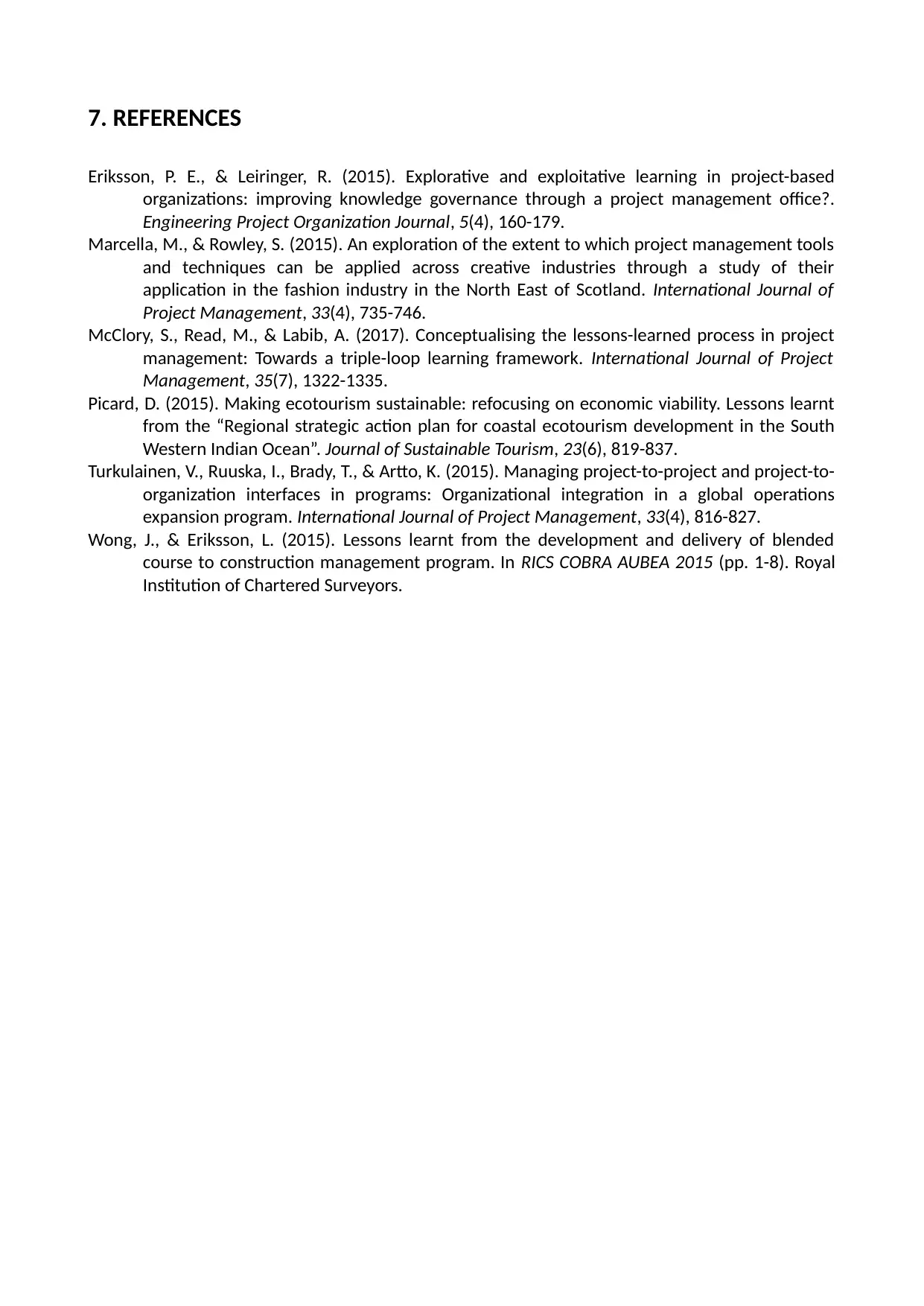
7. REFERENCES
Eriksson, P. E., & Leiringer, R. (2015). Explorative and exploitative learning in project-based
organizations: improving knowledge governance through a project management office?.
Engineering Project Organization Journal, 5(4), 160-179.
Marcella, M., & Rowley, S. (2015). An exploration of the extent to which project management tools
and techniques can be applied across creative industries through a study of their
application in the fashion industry in the North East of Scotland. International Journal of
Project Management, 33(4), 735-746.
McClory, S., Read, M., & Labib, A. (2017). Conceptualising the lessons-learned process in project
management: Towards a triple-loop learning framework. International Journal of Project
Management, 35(7), 1322-1335.
Picard, D. (2015). Making ecotourism sustainable: refocusing on economic viability. Lessons learnt
from the “Regional strategic action plan for coastal ecotourism development in the South
Western Indian Ocean”. Journal of Sustainable Tourism, 23(6), 819-837.
Turkulainen, V., Ruuska, I., Brady, T., & Artto, K. (2015). Managing project-to-project and project-to-
organization interfaces in programs: Organizational integration in a global operations
expansion program. International Journal of Project Management, 33(4), 816-827.
Wong, J., & Eriksson, L. (2015). Lessons learnt from the development and delivery of blended
course to construction management program. In RICS COBRA AUBEA 2015 (pp. 1-8). Royal
Institution of Chartered Surveyors.
Eriksson, P. E., & Leiringer, R. (2015). Explorative and exploitative learning in project-based
organizations: improving knowledge governance through a project management office?.
Engineering Project Organization Journal, 5(4), 160-179.
Marcella, M., & Rowley, S. (2015). An exploration of the extent to which project management tools
and techniques can be applied across creative industries through a study of their
application in the fashion industry in the North East of Scotland. International Journal of
Project Management, 33(4), 735-746.
McClory, S., Read, M., & Labib, A. (2017). Conceptualising the lessons-learned process in project
management: Towards a triple-loop learning framework. International Journal of Project
Management, 35(7), 1322-1335.
Picard, D. (2015). Making ecotourism sustainable: refocusing on economic viability. Lessons learnt
from the “Regional strategic action plan for coastal ecotourism development in the South
Western Indian Ocean”. Journal of Sustainable Tourism, 23(6), 819-837.
Turkulainen, V., Ruuska, I., Brady, T., & Artto, K. (2015). Managing project-to-project and project-to-
organization interfaces in programs: Organizational integration in a global operations
expansion program. International Journal of Project Management, 33(4), 816-827.
Wong, J., & Eriksson, L. (2015). Lessons learnt from the development and delivery of blended
course to construction management program. In RICS COBRA AUBEA 2015 (pp. 1-8). Royal
Institution of Chartered Surveyors.
1 out of 8
Related Documents
Your All-in-One AI-Powered Toolkit for Academic Success.
+13062052269
info@desklib.com
Available 24*7 on WhatsApp / Email
![[object Object]](/_next/static/media/star-bottom.7253800d.svg)
Unlock your academic potential
Copyright © 2020–2026 A2Z Services. All Rights Reserved. Developed and managed by ZUCOL.




